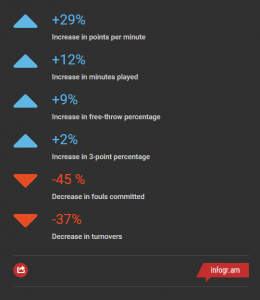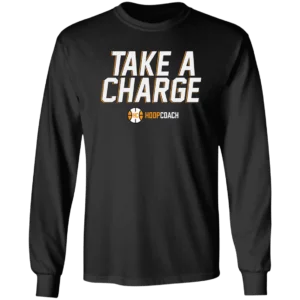“Sleep is a weapon!” Jason Bourne via Robert Ludlum
Early in the season one of our Athletic Trainers passed along an interesting infographic shared by a friend that is a Sleep Doctor. The infographic visualized the drastic improvement in efficiency in Andre Iguodala’s game when he slept more than 8 hours the night before a game. The study was conducted by a company called Jawbone. You can read the article here and see the stats below.

Needless to say, such gaudy increases in efficiency required some internet research. Per an ESPN article that cited a Stanford School of Medicine study of 11 men’s basketball players, when the players got 10 hours of a sleep a night they shot 9% better from the free throw line, and 9.2% from the three point line. Sold.
How can players improve their sleep?
If a player has a Fitbit or Apple Watch and you can get th them to buy into sharing their sleep data you can help them devise a plan to improve their quality and duration of sleep along with hopefully their performance. If they don’t have a wearable there are some mobile apps that might work. The most important thing is how long they sleep. 9-10 hours of sleep is ideal but probably quite difficult for a teenager. If you win that battle, you can move on to improving various stages of sleep. Both Fitbit and the Apple Watch have the ability to break down sleep into stages based on heart rate and movement. I tend to concentrate on the REM stage and Deep Sleep because they seem to be the most important for athletes. Here is an excerpt from a Fitbit post on the subject.
- REM sleep has been shown to play an important role in mood regulation, learning, and memory as your brain processes and consolidates information from the previous day so that it can be stored in your long-term memory..
- Deep sleep promotes physical recovery and aspects of memory and learning. This stage has also been shown to support your immune system.
To improve the quality of sleep players can try the following simple sleep hacks:
- No screens in bedroom
- Use a blue light filter app on their phones in the evening
- Leave phone in different room at bed time
- Lower temperature in the bedroom. Andre Iguodala set his room to exactly 57 degrees to lower his body’s core temp
- Shorter Naps during day – hour or less. But naps are good.
Routine before bed
- Stretch
- Breathing Exercises – available on newer Fitbit devices or just Google
- Read a Book
I am definitely not a sleep therapist or anything more than an intrigued coach but I am confident that nearly everyone can benefit from more rest and improved sleep. Whether this pans out on the court I will leave to the professionals.

Any tips or thoughts from coaches? Let us know in the comments below.



The link above does not work, the one to Jawbone. I did find a link that does work. It is https://www.wired.com/story/how-science-helps-the-warriors-sleep-their-way-to-success/
Thanks, Todd! Didn’t realize Jawbone went out of business